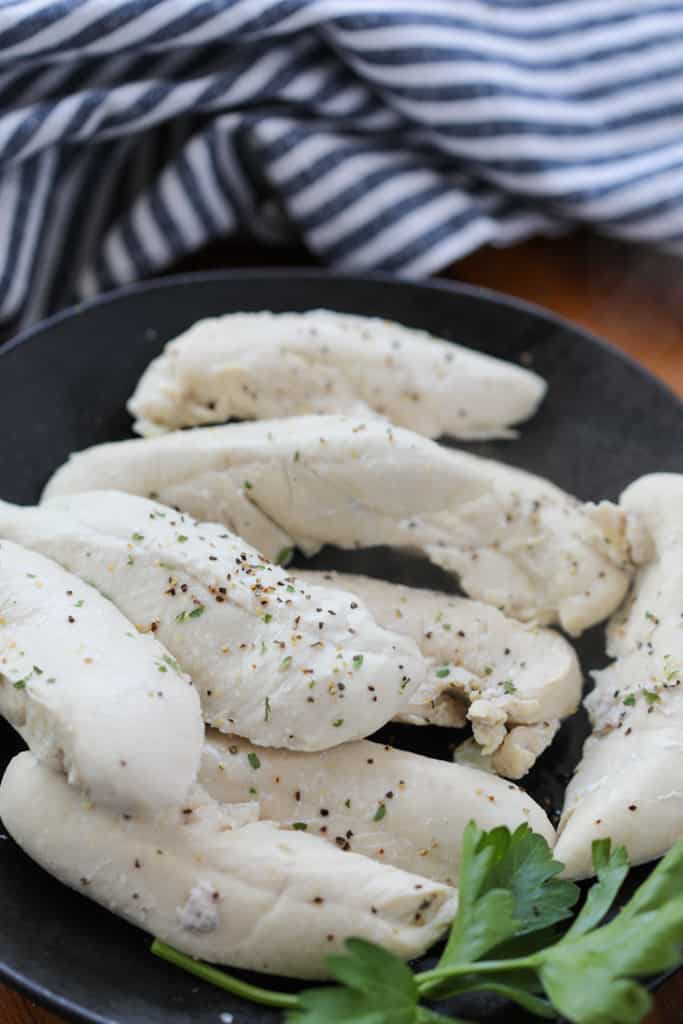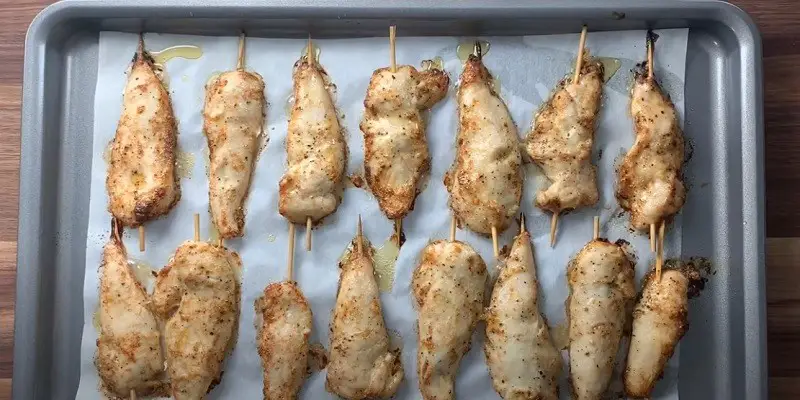Boil chicken tenders for about 10-12 minutes. Ensure they reach an internal temperature of 165°F (74°C).
Boiling chicken tenders is a simple, quick method for preparing a healthy and versatile protein. This process, taking roughly 10-12 minutes, suits people on the go who are seeking a nutritious meal component without investing a lot of time. Perfect for salads, wraps, or as a main dish, boiled chicken tenders can easily absorb flavors from spices and marinades, making them an adaptable option for numerous recipes.
For food safety and optimal texture, always check that the chicken has reached the recommended internal temperature. Keep your preparation straightforward and efficient; start with a pot of water, bring it to a gentle boil, and drop in the seasonings of your choice to infuse the tenders with delicious flavors.
Preparing Chicken Tenders
Welcome to the savory world of tender, juicy chicken delights! Preparing Chicken Tenders is an art that walks a fine line between tender bites and overcooked morsels. Mastering this skill begins with an understanding of boiling times to ensure every strip is perfectly cooked for your next meal or recipe.
Importance Of Cooking Time
Chicken tenders, beloved for their lean meat and quick cooking qualities, demand specific attention to cooking time. Too little time in the pot and they risk being undercooked, an invitation to potential foodborne illnesses. Cook them too long, and they become tough and unappetizing. Timing is crucial to achieving a succulent texture and the full flavor chicken tenders are known for.
Factors Affecting Boil Duration
The time it takes to boil chicken tenders can be influenced by several factors. Thickness of the tenders, starting temperature (whether they’re frozen or thawed), and the type of pot used all play a role. Here’s a quick rundown:
- Thickness: Thicker tenders require more time.
- Temperature: Frozen tenders lengthen the boiling process.
- Pot type: Heavier pots retain more heat and can reduce cooking time.
Pre-boil Preparation Steps
Setting the stage for perfectly boiled chicken tenders begins with these vital steps:
- Rinse the tenders under cold water and pat them dry with paper towels.
- If frozen, defrost in the refrigerator overnight or use the microwave for quicker results.
- Season the water with salt, herbs, or spices to infuse the tenders with extra flavor. Optional additions can also include vegetables like onion, celery, or carrots.
- Bring the pot of seasoned water to a rolling boil before carefully adding the chicken.
Remember, the key to impeccable chicken tenders lies in the details. With the correct preparation and mindful cooking, these strips of chicken will emerge from the pot with the perfect balance of tenderness and taste.

Credit: wholelottayum.com
Achieving Perfect Texture
Welcome to the comprehensive guide for boiling chicken tenders to perfection. Achieving the perfect texture in chicken tenders is an art that combines timing, temperature, and technique. The aim is not only to ensure safety and doneness but also to lock in juiciness and tenderness. When executed well, you’ll have delectable, succulent pieces of chicken that elevate any dish. Let’s dive into the intricacies of boiling chicken tenders to help you perfect your poultry game.
Testing For Doneness
To guarantee that chicken tenders are thoroughly cooked without compromising their texture, testing for doneness is critical. A reliable method is using an instant-read thermometer. Insert it into the thickest part of the tender and look for a safe internal temperature of 165°F (74°C). If you lack a thermometer, another technique involves slicing into the chicken; the meat should be opaque and the juices should run clear.
Risks Of Undercooking
Undercooking chicken is a gamble that’s not worth taking. Consuming poultry that hasn’t reached the appropriate internal temperature poses serious health risks, including food-borne illnesses like salmonella and campylobacter. Symptoms can be severe and include abdominal pain, nausea, fever, and more. Strictly adhere to proper cook times and temperatures to ensure both safety and enjoyment.
Overcooking Consequences
Just as dangerous as undercooking is the peril of overcooked chicken. Boiling chicken tenders too long leads to dry, tough meat, robbing you of the pleasure of a moist and tender bite. The key to avoiding this is not only watching the clock but also using tools like timers and thermometers. Remember, chicken tenders are lean and delicate, requiring attention and care to maintain their ideal texture.
How Long To Boil Chicken Tenders?
Mastering the art of boiling chicken tenders is a quintessential skill for both amateur cooks and seasoned chefs alike. Perfectly boiled chicken tenders can serve as a base for a myriad of dishes, from salads and sandwiches to pasta and rice meals. The key to ensuring that these slender cuts of protein are both safe to eat and succulent is nailing the cooking time. So, let’s unravel the timing mystery and help you achieve tender, flavorful chicken every time.
Standard Boiling Time
Boiling chicken tenders is a delicate process and finding the optimal boiling time is crucial for a juicy result. The standard boiling time for chicken tenders is typically about 10 to 15 minutes. This range should suffice when working with tenders that are approximately the same size and thickness, ensuring they’re cooked through without becoming tough.
Adjusting Time For Size Variations
However, not all tenders are created equal. The size and thickness can greatly influence boiling time. To achieve perfection:
- For smaller or thinner tenders: Reduce the boiling time slightly. Begin checking for doneness at around 8 minutes.
- For larger or thicker tenders: Allow more time to cook. They can take up to 20 minutes to be fully cooked through. Always ensure there is no pinkness in the middle.
Using a meat thermometer can take away the guesswork — chicken is ready when the internal temperature reads 165°F (75°C).
Altitude Impact On Boiling Time
It’s not just size that matters; altitude plays a role, too. At higher altitudes, water boils at a lower temperature due to decreased air pressure. This means that you’d need to extend the boiling time for your chicken tenders. At altitudes above 3,000 feet, you may need to increase the cooking time by at least 1 to 2 minutes for every 1,000 feet elevation. Keep a close eye on your cooking and adjust accordingly.
| Altitude (feet) | Additional Boiling Time |
|---|---|
| 3,000 to 5,000 | 1-3 minutes |
| 5,000 to 7,000 | 3-5 minutes |
| 7,000 to 10,000 | 5-8 minutes |
Boiling chicken tenders can be a straightforward process, but these key factors can make all the difference between good and great. Pay attention to the size, adjust for variations, and remember to consider the altitude, and you’ll be rewarded with tender, flavorful chicken perfect for any dish.
Seasoning Tips Before Boiling
Embracing the right seasoning tips before boiling can transform your chicken tenders from bland to grand. It’s not just about the boiling time; it’s about infusing the meat with flavors that will enhance the tenderness and juiciness of your dish. To ensure these delicate strips of chicken are as tasty as they can be, let’s dive into some essential seasoning methods you should employ prior to cooking.
Herbs And Spices For Optimal Taste
Before the chicken tenders ever hit the water, it’s crucial to season them to perfection. By doing so, you boost the flavor profile of your recipe. Here are some herbs and spices combinations to consider:
- Traditional Blend: Combine salt, black pepper, paprika, and garlic powder for a classic flavor.
- Italian Twist: Mix together dried basil, oregano, thyme, and a pinch of red pepper flakes.
- Herb Medley: Fresh parsley, rosemary, and thyme offer a garden-fresh aroma.
Spread these seasoning blends evenly over the chicken tenders, ensuring each piece is coated for maximum flavor infusion during boiling.
Marinades For Tenderizing
Marinades serve a dual purpose — not only do they impart flavor, but they also tenderize the chicken, ensuring every bite is succulent. Here’s a selection of marinade ideas:
- Citrus Zest: Use lemon or orange juice mixed with olive oil and your choice of herbs to break down the tenderness.
- Asian Inspiration: Combine soy sauce, sesame oil, ginger, and garlic for an Eastern flair.
- Yogurt-based: A blend of Greek yogurt, cucumber, and dill can create a creamy texture.
Allow the chicken to marinate for at least 30 minutes before boiling, though a few hours or overnight in the refrigerator is ideal for a deeper infusion of flavor.
Post-boil Considerations
Once you’ve perfected the boil and your tender chicken strips are cooked through, the journey to a satisfying meal isn’t quite over. The steps you take after boiling can make or break the ultimate tenderness and flavor of your chicken. By considering the resting time and serving suggestions, you elevate a simple boiled chicken tender to a delightful dining experience. Let’s delve into these crucial post-boil considerations.Resting Time for Juiciness
Resting Time For Juiciness
It’s tempting to dive right into your freshly boiled chicken tenders, but patience pays off. Resting your chicken is a non-negotiable step in ensuring maximum juiciness. Once boiled, the proteins within the chicken fibers need a moment to relax and reabsorb the moisture that’s been redistributed. This process results in chicken that’s moist and tender rather than dry and tough.
- Remove the chicken from the heat source and set it aside.
- Cover the tenders loosely with foil to retain warmth without causing them to sweat.
- Allow the chicken to rest for about 5 to 10 minutes before cutting or serving.
Serving Suggestions
Serving Suggestions
Boiled chicken tenders offer a versatile canvas for an array of dishes, each one an opportunity to excite the palate. How you serve them can transform this simple ingredient into a meal to remember. After boiling and resting, you’re ready to incorporate flavors and textures.
- Shred the tenders and mix with BBQ sauce for a savory sandwich filling.
- Slice them up for a nutritious salad topping.
- Combine with pasta and your favorite sauce for a comforting entree.
- Keep it simple and serve as the main protein alongside steamed vegetables and whole grains.
Regardless of your choice, remember to complement your chicken with seasonings, herbs, and sauces to elevate its natural flavors. From a dash of salt and pepper to a sprinkle of fresh parsley, every little addition will turn your boiled chicken tenders into a dish to savor.
Frequently Asked Questions For How Long To Boil Chicken Tenders?
What’s The Ideal Time For Boiling Chicken Tenders?
Boiling chicken tenders takes about 10-15 minutes, ensuring they’re fully cooked and tender.
Can You Overcook Chicken Tenders By Boiling?
Yes, overcooking can make chicken tenders tough and rubbery. Always check for doneness without exceeding the recommended time.
How To Know If Boiled Chicken Tenders Are Done?
Check by piercing them with a fork; if the juices run clear and the meat is no longer pink, they’re done.
Are Boiled Chicken Tenders Healthy?
Boiled chicken tenders are a low-fat, protein-rich option that is healthy when consumed in moderation and prepared without added fats.
Conclusion
Mastering the art of boiling chicken tenders is a kitchen skill worth having. It leads to tender, flavorful meat that can elevate your dishes. Boiling time is crucial—too long and they dry out, too short and they’re unsafe. Aim for the sweet spot, typically 10-12 minutes for juicy, delicious tenders that enhance any recipe.
Last Updated on April 23, 2025 by Pauline G. Carter

